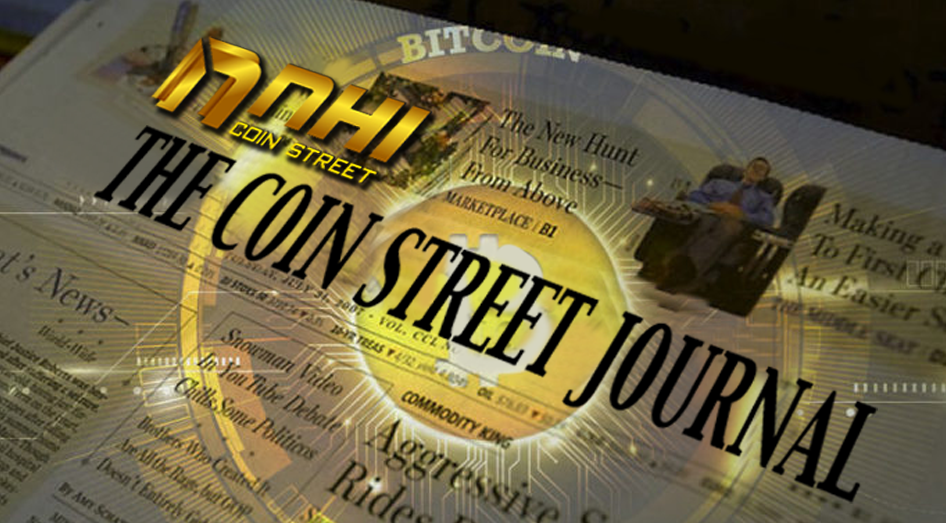THE COIN STREET JOURNAL
Market News - May 7th 2024

QUBIC SEES A 21% SURGE IN 24 HOURS
QUBIC, the native token of the L1 blockchain Qubic, experienced a significant surge of 21% within the last 24 hours, fueled by analyst predictions of a potential 1000x increase during an anticipated altcoin season. Currently trading at $0.000007 with a 24-hour trading volume of 2.60 million and a market cap of $616.33 million, QUBIC’s rise has caught the attention of investors and analysts alike.
Qubic, a community-driven project led by founder Sergey Ivancheglo, focuses on developing AI infrastructure through a decentralized network. It introduces innovative concepts such as useful-Proof-of-Work (uPoW) and Quorum consensus, with its core being Aigarth, an advanced AI system leveraging billions of neural networks to simulate human brain complexity. The project’s unique approach to Initial Public Offerings (IPOs) democratizes blockchain technology investment, enabling direct investment in smart contracts for passive income.
The recent surge in QUBIC’s token value coincides with optimistic projections from Braver Crypto, a notable trader, who highlighted the token’s remarkable growth. Just seven months ago, its value was a mere $350 per billion, with a market cap of $18 million. Braver Crypto anticipates a potential increase to $350k per billion (or $0.00035 per token), a staggering 1000x rise.
Braver Crypto’s optimism stems from several positive developments and expectations surrounding QUBIC. These include the impending bullish trend in the altcoin market, benefiting the token, and its planned listings on various centralized exchanges (CEX) such as GATE CEX. Additionally, the launch of QX DEX and the introduction of the first meme token, CFB, were announced, further enhancing QUBIC’s prospects.
The trader also highlighted potential partnerships and integrations that could propel QUBIC’s value, including listings on blockchain-based advertising solutions platform XCHNG and collaborations with major corporations like Microsoft and HSBC, as discussed at the QUBIC Asia event. Furthermore, the integration of AIgarth L2, reaching human intelligence levels, and the introduction of a feeless system with token burns contribute to the bullish outlook for QUBIC.
Braver Crypto concludes with a bold forecast of a 2000x return on investment from the initial $350 per billion buy-in by the end of the current bull market, reinforcing the belief in QUBIC’s potential for exponential growth and investor profitability.
TUYO AIMS TO SIMPLIFY CRYPTOCURRENCY INTERACTIONS
Tuyo, a newly unveiled self-custodial crypto wallet, aims to simplify cryptocurrency interactions for users. Created by Jorge Izquierdo, co-founder of Aragon, the wallet has been in private beta since February and is now accessible via a public waitlist. Izquierdo’s vision is to construct a user-friendly environment where individuals retain custody of their crypto assets without facing the complexities commonly associated with decentralized finance (DeFi) interactions.
The wallet, named Tuyo, facilitates buying, selling, and holding various cryptocurrencies across multiple blockchain networks, including Ethereum, Optimism, Arbitrum, and Base. Despite operating on diverse networks, Tuyo conceals technical intricacies from users, streamlining the experience. Izquierdo emphasizes the significance of abstracting away confusing elements to enhance user interaction, leveraging advancements like account abstraction and faster decentralized exchanges on Layer 2 networks.
Account abstraction eliminates the need for users to individually approve transactions, consolidating multiple actions into a single transaction. This simplification, combined with faster Layer 2 decentralized exchanges, culminates in an experience akin to centralized exchanges but with the added benefit of self-custody. Users retain control over their crypto assets, even when engaging with decentralized exchanges facilitated by the Tuyo wallet.
Tuyo’s co-founder, Alejandro Perezpayá, brings valuable experience from his tenure at Allfunds, where he led digital product development following an acquihire in 2018. The team envisions expanding Tuyo’s capabilities to include additional blockchain networks and support for DeFi applications in the near future, all while maintaining a self-custodial model.
Looking ahead, Tuyo plans to integrate more blockchain networks and DeFi support, with a goal to launch on app stores following the summer season. Izquierdo envisions Tuyo as a bridge between traditional centralized exchanges and the decentralized finance ecosystem, offering users a seamless experience without compromising on security and control over their assets.
CAUTION: ELON MUSK IS NOT AFFILIATED WITH ANY CRYPTO TOKENS OR EXCHANGES
The designer behind Dogecoin’s graphics, known as cb_doge, recently issued a cautionary reminder emphasizing that Elon Musk and his companies are not affiliated with any crypto tokens or exchanges. Despite Musk’s past tweets about cryptocurrencies, including Dogecoin, he has maintained that neither he nor his companies are directly involved in creating or endorsing crypto tokens. While Musk’s tweets have influenced prices and public interest in various cryptocurrencies, he has made it clear that he has no plans to launch his cryptocurrency.
Elon Musk, CEO of Tesla and SpaceX, has often referred to himself as “the DogeFather” and has tweeted about Dogecoin since 2019. His tweets about cryptocurrencies have led to price increases and heightened attention, but he has reiterated that his companies do not create crypto tokens. Last November, Musk reaffirmed this stance, stating that none of his companies would ever create a crypto token, responding to a post that mistakenly associated his company xAI with a meme coin xAI Corp.
Although Musk and his companies have never launched a cryptocurrency, Tesla does accept Dogecoin as payment for some merchandise. However, this acceptance does not signify Musk’s involvement in creating or endorsing the cryptocurrency. The reminder from the Dogecoin designer, supported by Musk’s statements, is essential for the crypto market, ensuring investors base their decisions on accurate information and preventing unfounded rumors.
Despite Musk’s support for digital assets and his influence on the crypto market through his tweets, he has consistently emphasized his companies’ lack of direct involvement in creating or endorsing cryptocurrencies. This clear distinction between Musk’s personal interests and his companies’ actions is crucial for investors and enthusiasts to understand. By staying informed about Musk’s stance on cryptocurrencies, investors can make more informed decisions in the volatile crypto market.
CRYPTO COULD PLAY A SIGNIFICANT ROLE IN 2024 ELECTIONS
A recent survey by the Digital Currency Group (DCG) and The Harris Poll revealed that voters’ attitudes toward digital assets could play a significant role in the 2024 United States elections. The online poll, conducted with 1,201 registered voters in April, found that over two-thirds of respondents believed crypto to be more equitable than the traditional financial system. Furthermore, more than 90% of respondents in key swing states like Michigan, Nevada, Ohio, Montana, Pennsylvania, and Arizona expressed intent to vote in the upcoming elections, indicating the potential importance of crypto-related issues for candidates.
Kristin Smith, CEO of the Blockchain Association, emphasized the growing significance of digital assets in electoral politics, noting that 26% of voters are actively considering candidates’ stances on crypto when making their decisions. Interestingly, the survey revealed that positive views on crypto did not significantly differ based on household income or political party affiliation. However, Ohio stood out with 77% of voters expressing a more negative sentiment towards crypto.
In Ohio, the Senate race is anticipated to be particularly significant, with Democrat Sherrod Brown, chair of the Senate Banking Committee, facing off against Republican Bernie Moreno. Despite the outcome, Democrats may still maintain control of the Senate and potentially select a different committee chair. Additionally, Public Citizen reported that three crypto-focused political action committees had collectively raised over $100 million to support candidates from both parties in the upcoming election, reflecting the increasing influence of digital assets in political fundraising.
The 2024 elections hold high stakes, with control of the U.S. presidency, House of Representatives, and Senate up for grabs. Currently, Republicans hold a narrow majority in the House, while Democrats have a slim majority in the Senate. Given the tight races in swing states and the growing interest in crypto-related issues among voters, candidates and political parties are likely to focus more on their positions on digital assets as part of their electoral strategies.
